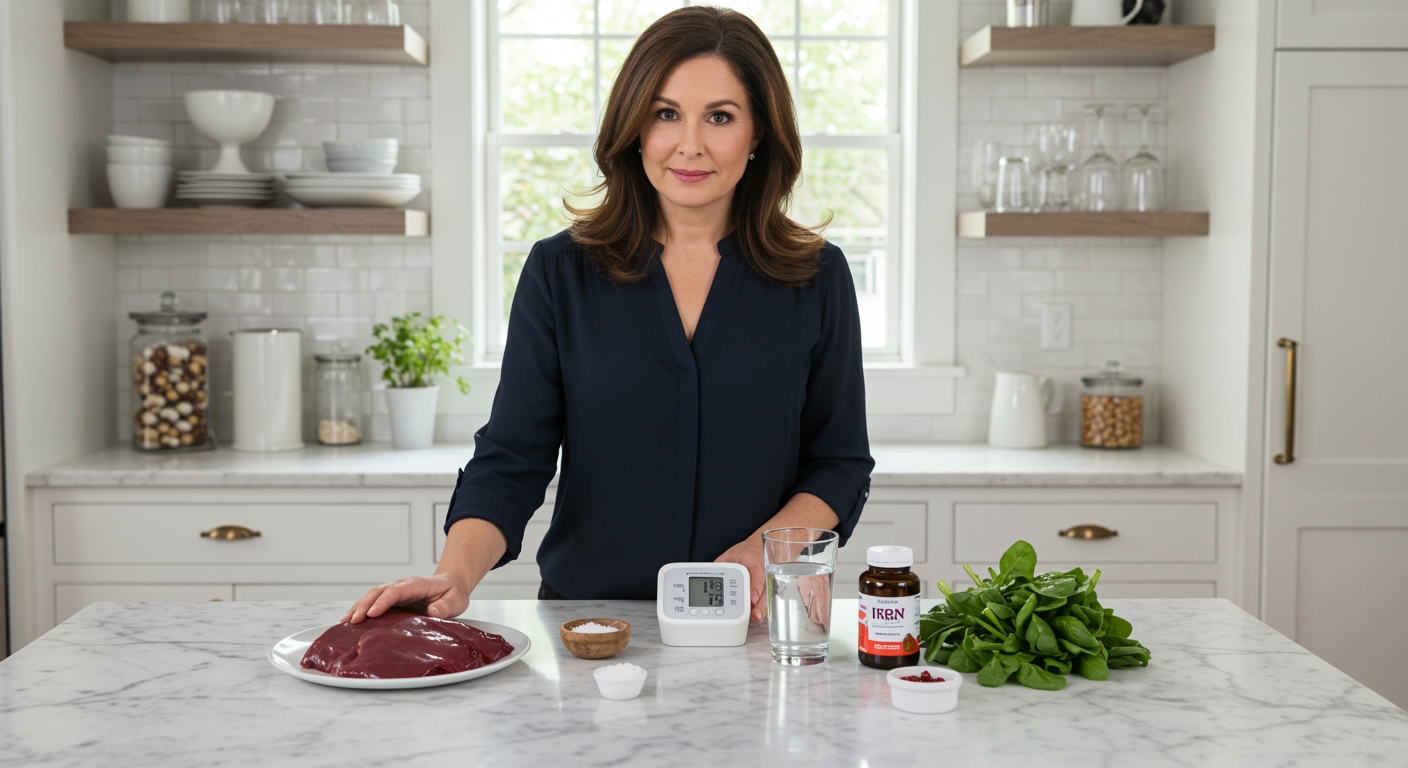✪ Key Takeaway: Liver can help raise low blood pressure through iron, B vitamins, and CoQ10 that support healthy circulation.
Introduction
Your grandmother probably told you to eat liver, but you wrinkled your nose and pushed it around your plate.
Now you are dealing with low blood pressure and wondering if those old-fashioned foods might actually help your condition.
Hi, I am Abdur, your nutrition coach and today I am going to explain how liver can support healthy blood pressure levels and why this nutrient powerhouse deserves a place on your plate.
What Makes Liver So Special for Blood Pressure?
Liver contains more nutrients per gram than almost any other food on the planet.
This organ meat packs an incredible punch of iron, B vitamins, and CoQ10 that your cardiovascular system desperately needs.
Iron deficiency is one of the most common causes of low blood pressure because your body cannot produce enough healthy red blood cells without adequate iron.
When you have fewer red blood cells, your blood volume decreases and your blood pressure drops accordingly.
Liver provides heme iron, which your body absorbs much more efficiently than the iron found in plant foods.
Just 100 grams of beef liver contains about 30 milligrams of iron, which is more than most people need in an entire day.
✪ Fact: Liver contains 7 times more iron than lean beef and 14 times more than chicken breast.
How Do B Vitamins in Liver Support Your Circulation?
The B vitamin complex in liver works like a well-oiled machine to support your cardiovascular health.
Vitamin B12 helps your body produce healthy red blood cells and prevents a type of anemia that can cause dangerously low blood pressure.
Folate works alongside B12 to ensure proper DNA synthesis in your blood cells, which keeps your circulatory system functioning optimally.
Liver contains more B12 than any other food source, with just one serving providing over 1000% of your daily needs.
This massive dose of B12 can quickly correct deficiencies that might be contributing to your low blood pressure symptoms like fatigue and dizziness.
The riboflavin and niacin in liver also support energy production in your cells, which helps your heart pump blood more effectively throughout your body.
✪ Pro Tip: Eat liver with vitamin C-rich foods like bell peppers to maximize iron absorption and cardiovascular benefits.
Can CoQ10 in Liver Really Boost Your Blood Pressure?
Coenzyme Q10 is a powerful compound that your heart muscle needs to generate energy efficiently.
Your body produces less CoQ10 as you age, which can contribute to cardiovascular problems including low blood pressure.
Liver provides a natural source of CoQ10 that helps your heart pump blood more forcefully, which can raise your blood pressure to healthier levels.
This compound also acts as an antioxidant that protects your blood vessels from damage caused by free radicals.
When your blood vessels are healthier, they can maintain better vascular tone and support optimal blood pressure readings.
Research shows that people with low blood pressure often have lower levels of CoQ10 in their blood compared to those with normal blood pressure.
✪ Note: CoQ10 levels naturally decline after age 40, making dietary sources like liver increasingly important for heart health.
What About the Cholesterol and Sodium Content?
Many people worry about the cholesterol content in liver, but this concern is largely misplaced for most individuals.
Your body produces about 80% of its cholesterol internally, and dietary cholesterol has minimal impact on blood cholesterol levels for most people.
The natural sodium in liver can actually be beneficial for people with low blood pressure because sodium helps increase blood volume.
Unlike processed foods loaded with table salt, liver provides sodium along with potassium and magnesium that help balance electrolytes naturally.
This balanced mineral profile supports healthy fluid retention without causing the negative effects associated with excessive processed sodium intake.
If you have been told to increase your salt intake for low blood pressure, liver offers a more nutritious way to accomplish this goal.
✪ Fact: One serving of liver contains about 90mg of natural sodium, which is less than a slice of bread.
How Much Liver Should You Eat and How Often?
You do not need to eat liver every day to experience its blood pressure benefits.
Most nutrition experts recommend eating 100-200 grams of liver once or twice per week to avoid vitamin A toxicity.
Liver is extremely high in vitamin A, and consuming too much can lead to hypervitaminosis A, which causes symptoms like nausea and headaches.
Start with smaller portions of about 50-75 grams to see how your body responds, especially if you are not used to eating organ meats.
You can mix liver with ground beef to make it more palatable while still getting the nutritional benefits for your blood pressure.
Some people prefer to take desiccated liver supplements, but whole food sources are generally more effective and better absorbed by your body.
✪ Pro Tip: Soak liver in milk for 30 minutes before cooking to reduce the strong flavor and make it more enjoyable to eat.
The Bottom Line
Liver can be an excellent addition to your diet if you are dealing with low blood pressure, thanks to its incredible concentration of iron, B vitamins, and CoQ10.
Sometimes the most powerful medicine comes disguised as the foods our ancestors ate without question, and liver is a perfect example of this timeless wisdom.
I would love to hear about your experiences with liver or any questions you might have about incorporating this nutrient-dense food into your low blood pressure management plan, so please share your thoughts in the comments below.
References
At NutritionCrown, we use quality and credible sources to ensure our content is accurate and trustworthy. Below are the sources referenced in creating this article:
- WebMD: Is Liver Good for You?
- PMC: Iron Deficiency and Cardiovascular Disease
- MedicineNet: What Foods Are Good If You Have Low Blood Pressure?
- Riverside: Best Food for Heart





